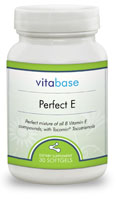| Vitamin E is found in the fatty parts of foods. The best sources of vitamin E are unsaturated fats, such as vegetable oils. These include sunflower, safflower, canola, olive, and wheat germ oils. It is also found in avocados, nuts, seeds, wheat germ, and whole grain, or unrefined, products. Green leafy vegetables have smaller amounts. Soybean oil has a form of vitamin E that has little influence on health. This oil is not a good source of vitamin E. The vast majority of vitamin E supplements contain a single form of the vitamin, alpha-tocopherol. More specifically, most supplements contain a natural form of alpha-tocopherol, called d-alpha tocopherol (or d-alpha tocopheryl acetate). Practitioners often prefer this form of the vitamin over a synthetic version called l-alpha tocopherol.
Vitamin E is actually a family of vitamins involving many tocopherols and many tocotrienols, some practitioners recommend vitamin E supplements containing not only d-alpha tocopherol, but other tocopherol and tocotrienol forms of vitamin E. Supplements containing this wide variety of vitamin E forms are typically referred to as "mixed tocopherol" or "mixed tocotrienol" supplements. Vitamin E that is produced industrially is derived from natural sources and is obtained by molecular distillation of edible vegetable oil products.
The best sources of vitamin E are vegetable oils, such as corn oil, soy oil, and peanut oil. Animal fats, such as butter and lard, contain lower levels of the vitamin. Other foods that contain a significant amount of vitamin E include liver, eggs, nuts (almonds, hazelnuts, and walnuts); sunflower seeds; corn-oil margarine; mayonnaise; cold-pressed vegetable oils, including olive, corn, safflower, soybean, cottonseed, and canola; dark green leafy vegetables like spinach and kale; greens (beet, collard, mustard, turnip) sweet potatoes; avocado, asparagus and yams.
Corn oil contains about 16 mg of alpha-tocopherol per 100 g oil. Wheat-germ oil contains 120 mg alpha-tocopherol per 100 g oil. Fish, eggs, and beef contain relatively low levels of the vitamin, with about 1 mg per 100 g food. Soybean and corn oils contain about ten times more gamma-tocopherol than alpha-tocopherol. Palm, ricebran and coconut oils are rich sources of tocotrienols. Alpha-tocopherol is the major form of vitamin E in animal products and is found mainly in the fatty portion of the meat.
Soybean oil is the most common oil used in products like salad dressing and mayonnaise. Heating oils to high temperatures, such as in frying, can destroy vitamin E. Storage and freezing foods for a long time can also destroy vitamin E. Certain vegetable oils should contain significant amounts of vitamin E. However, many of the vegetable oils sold in supermarkets have had the vitamin E removed in processing. The high amounts found in supplements, often 100 to 800 IU per day, are not obtainable from eating food. | 